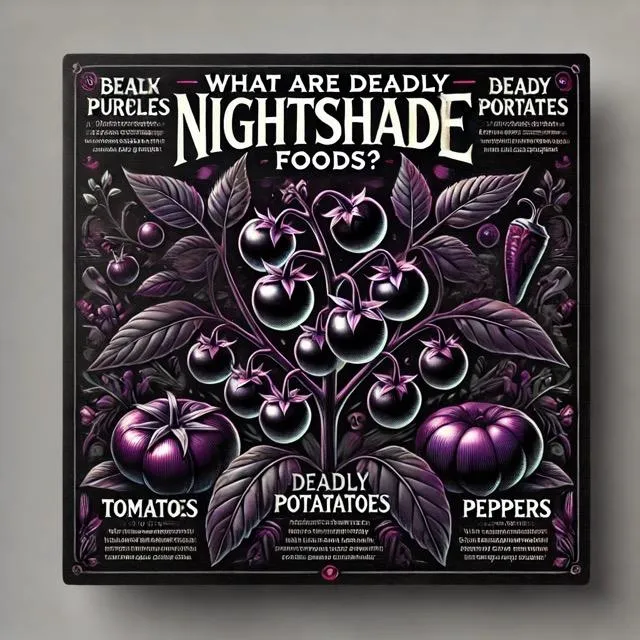
What are Deadly Nightshade Foods?
### Deadly Nightshade (Solanaceae) Family: A Natural Health Perspective
What is the Deadly Nightshade Family?
The nightshade family (Solanaceae) is a large family of flowering plants that includes some of the most widely consumed vegetables, such as tomatoes, potatoes, peppers, and eggplants. However, the family also includes several toxic plants, the most notorious being Atropa belladonna, commonly known as deadly nightshade. This plant contains powerful alkaloids that can be toxic.
The Solanaceae family has a dual reputation: many of its plants are valued for their nutritional benefits, while others, like deadly nightshade, are infamous for their toxicity. From a natural health perspective, some individuals may have sensitivities to even the edible members of this family, particularly those with autoimmune conditions, joint pain, or inflammatory disorders.
Common Plants in the Nightshade Family
Many plants in the nightshade family are staples in modern diets, while others are known for their toxic effects. Here’s a list of common nightshades, both edible and toxic:
Edible Nightshades:
1. Tomatoes
2. Potatoes (excluding sweet potatoes, which are not nightshades)
3. Eggplants (aubergines)
4. Bell peppers (sweet peppers)
5. Hot peppers (including chili peppers, jalapeños, and paprika)
6. Tomatillos
7. Goji berries
8. Ground cherries
Toxic Nightshades (or medicinal in small doses):
1. Deadly Nightshade (Atropa belladonna): Contains alkaloids like atropine and scopolamine, which can be toxic and cause hallucinations, dilated pupils, and even death in large amounts.
2. Jimsonweed (Datura stramonium): Known for its hallucinogenic and toxic effects.
3. Mandrake (Mandragora officinarum): Historically used in magic and herbal medicine, it’s highly toxic in large quantities.
4. Tobacco (Nicotiana tabacum): While used widely in smoking, it contains nicotine, a potent and addictive substance.
Symptoms of Sensitivity to Nightshade Plants
While edible nightshades are not inherently harmful, some people are sensitive to them, particularly those with autoimmune conditions like rheumatoid arthritis, lupus, or inflammatory bowel disease. This sensitivity is largely attributed to the alkaloids found in nightshades, such as solanine (in potatoes) and capsaicin (in peppers), which may promote inflammation in certain individuals.
Common symptoms of nightshade sensitivity include:
- Joint pain and stiffness: Particularly in individuals with arthritis or other inflammatory conditions.
- Digestive issues: Bloating, gas, diarrhea, and stomach cramps.
- Skin reactions: Rashes, hives, or eczema.
- Fatigue and brain fog: General feelings of tiredness or cognitive dullness.
- Headaches: Some individuals report migraines or headaches after consuming nightshades.
Naturopathic Perspective on Nightshade Sensitivity
From a naturopathic standpoint, managing sensitivity to nightshades or reducing the risk of toxicity from plants like deadly nightshade involves dietary adjustments, inflammation management, and careful monitoring of symptoms. Here are some key strategies:
1. Elimination Diet:
Similar to dealing with solanine sensitivity, many naturopathic practitioners recommend starting with an elimination diet to identify if nightshade plants are triggering symptoms. Removing all nightshades for a few weeks can help, followed by a slow reintroduction of foods like tomatoes, potatoes, or peppers, one by one.
2. Anti-Inflammatory Diet:
If nightshades are aggravating your health, replacing them with anti-inflammatory foods can support the body’s natural healing processes. Foods rich in omega-3 fatty acids (like salmon, chia seeds, and flaxseeds), turmeric, and leafy greens can help reduce overall inflammation.
3. Support Gut Health:
Since sensitivity to nightshades may be linked to gut health, focusing on strengthening the gut lining can reduce symptoms. Probiotics, prebiotic-rich foods, and gut-healing foods like bone broth and L-glutamine are often recommended.
4. Herbal Remedies for Inflammation:
- Turmeric: Contains curcumin, a natural anti-inflammatory compound that can reduce joint pain and inflammation associated with nightshade sensitivity.
- Ginger: Another potent anti-inflammatory herb, ginger can alleviate digestive issues and support overall gut health.
- Boswellia: Known for its joint-pain-relieving effects, boswellia can be helpful for individuals dealing with arthritis or inflammatory conditions triggered by nightshades.
5. Mindful Consumption of Nightshades:
If nightshade sensitivity is not severe, some individuals can tolerate these foods in small quantities. Cooking nightshades (especially potatoes and tomatoes) can reduce the levels of solanine and other alkaloids. Peeling potatoes and avoiding green or sprouted ones also help reduce toxicity.
6. Homeopathic Uses of Deadly Nightshade (Belladonna):
While deadly nightshade is extremely toxic in large doses, in homeopathic medicine, small, highly diluted doses of belladonna are used for various ailments. It’s commonly employed to treat fever, inflammation, and headaches. Always consult with a trained homeopath or naturopath before using belladonna, as the line between medicinal and toxic is very fine.
Conclusion
The nightshade family includes both beneficial and toxic plants, ranging from staple foods like tomatoes and potatoes to dangerous species like deadly nightshade. While many people can consume nightshades without any problems, some may experience sensitivity that can lead to symptoms like joint pain, digestive issues, and inflammation. From a naturopathic perspective, managing nightshade sensitivity involves dietary changes, supporting gut health, and incorporating natural anti-inflammatory remedies. For the highly toxic plants, such as deadly nightshade, extreme caution is advised due to their potent and potentially lethal effects.
Want to find out if you have food sensitivities?
Try our hair scan analysis for food intolerance. Click below to learn more:
https://app.closersystem.com/v2/preview/xwdiwuunihW45pIdVVzr?notrack=true
### References
1. Neal, A. "The Effects of Solanaceae (Nightshades) on Health and Inflammation." Journal of Nutrition and Food Sciences, 2019.
2. Watson, R. R. "Nightshade Vegetables and the Impact on Human Health." Encyclopedia of Human Nutrition, 3rd ed., 2012.
3. Grundmann, O. "Atropa belladonna: Deadly Nightshade." Journal of Herbal Medicine, 2015.